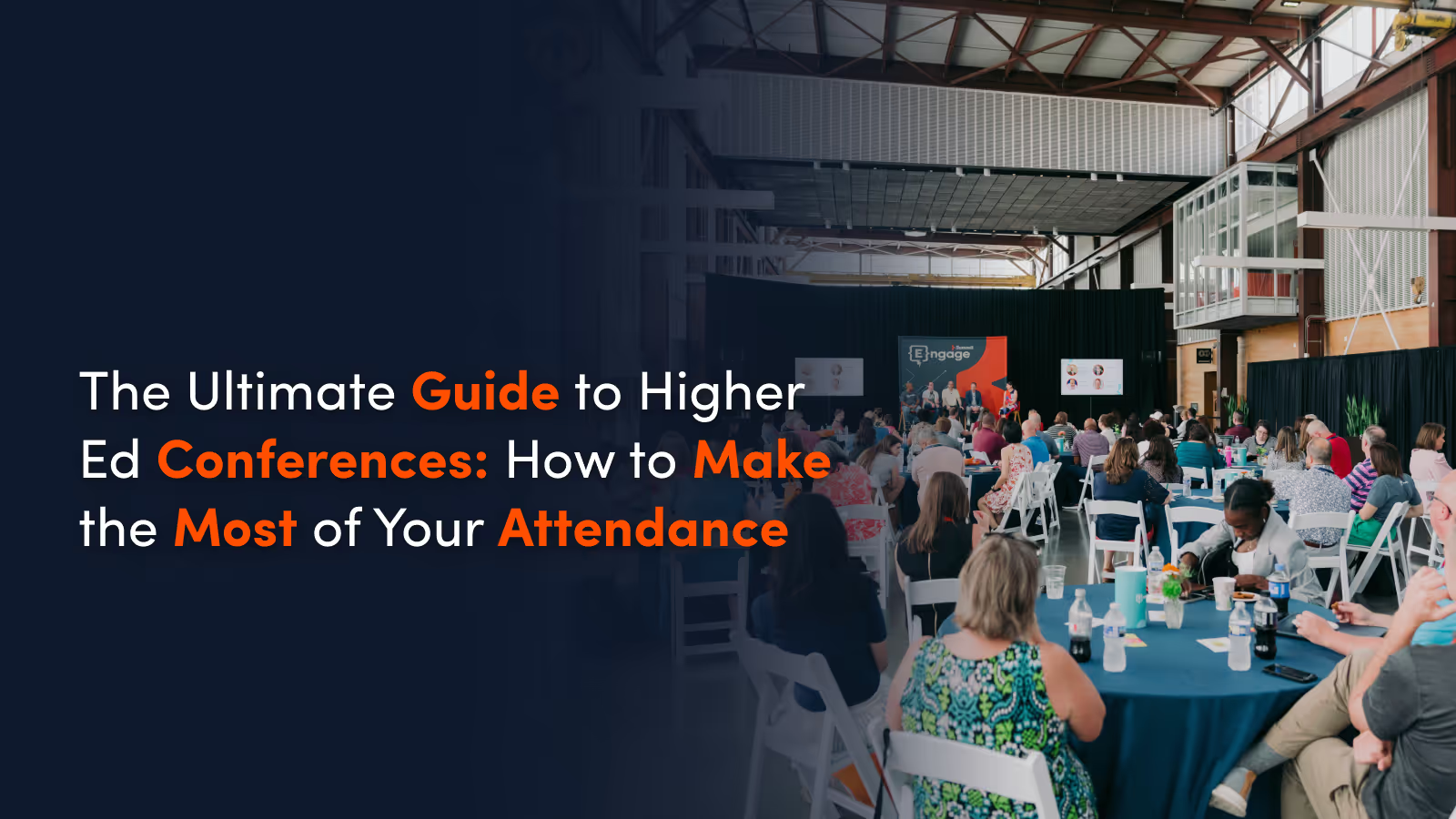About the Blog
Higher ed conferences are a goldmine for networking, learning, and uncovering the latest trends in higher education marketing, enrollment strategies, and ed tech tools. But to truly maximize your experience, you need a game plan. From pre-conference preparation to post-event follow-ups, a strategic approach will help you turn insights into action.
In this guide, we’ll break down the essential strategies to make the most of your next higher ed conference. Whether you're an admissions professional, enrollment marketer, or higher ed leader, these tips will help you forge meaningful connections, attend the most valuable sessions, and leverage AI-driven tools for smarter follow-ups.
Pre-Conference Planning: Set Yourself Up for Success
Walking into a conference without a plan is like showing up for finals without studying—you might get something out of it, but you won’t maximize the value. A little preparation can make all the difference.
Define Your Goals and Prioritize Sessions
Start by identifying what you want to achieve at the conference:
- Are you looking to explore the latest AI in higher education?
- Searching for new enrollment marketing strategies?
- Hoping to meet potential partners?
Once you’ve defined your objectives, review the conference agenda and mark the must-attend sessions that align with your goals.
Research Speakers and Attendees
Most conferences publish speaker lists and attendee directories in advance. Take time to research the experts leading sessions and the organizations attending.
- Follow key speakers on LinkedIn and engage with their content before the event.
- Check attendee lists to see if there are potential collaborators, clients, or thought leaders you want to connect with.
- Join pre-event LinkedIn groups or Twitter/X chats to start networking ahead of time.
Schedule Meetings in Advance
Don’t wait until you arrive to set up meetings! Many industry leaders and vendors book their schedules early.
- Use LinkedIn or conference networking apps to send personalized messages (not just generic connection requests).
- Schedule coffee chats or quick meetups with speakers, vendors, or peers.
Follow-Up Template: Hi [Name], I’m attending [Conference Name] and saw that you’re speaking on [Topic]. I’d love to connect for a quick chat to discuss [specific interest]. Would you be available for a coffee break?
Networking Hacks: Make Meaningful Connections
Networking at higher ed conferences goes beyond exchanging business cards. To build real relationships, you need to be intentional and strategic.
Engage in Conversations, Not Just Small Talk
Networking at higher ed conferences goes beyond exchanging business cards. To build real relationships, be intentional and strategic.
Skip: “So… what do you do?”
Ask: “What’s the biggest challenge in student recruitment you’ve tackled this year?”
People remember genuine conversations more than generic intros.
Leverage Social Media to Amplify Your Presence
Don’t just be a passive attendee—engage online to expand your reach!
- Live-tweet key insights from sessions.
- Post takeaways on LinkedIn.
- Use the event hashtag to engage with other attendees and speakers.
Example Post: Just wrapped up an incredible session at Element451’s AI Engage Summit on AI-powered enrollment strategies. Key takeaway: Students now expect personalized engagement at scale—are we keeping up? #EdTech #AI #HigherEdMarketing
Be Intentional with Follow-Ups
After meeting someone, jot down a quick note about your conversation on their business card or in your phone.
Follow-Up Formula: 1) Mention a specific topic you discussed, 2) Reference key takeaways from the event, 3) Suggest a next step (e.g., virtual coffee, article share, or future event).
Example Message: “It was great discussing AI in higher education with you at [Event Name]! Let’s keep the conversation going—would love to hear more about how your team is implementing AI in student engagement.”
Must-Attend Sessions: Where to Focus Your Time
Look for Data-Driven and Actionable Insights
Not all sessions are created equal. Prioritize ones that offer concrete strategies, like:
- Enrollment marketing case studies
- Data-backed student success strategies
- AI implementation and performance indicators in higher ed
Pro Tip: Avoid overly generic sessions that feel like sales pitches—opt for sessions that offer tangible takeaways.
Attend Interactive and Hands-On Workshops
Workshops and roundtable discussions offer deeper engagement than keynotes. These sessions allow for:
- Direct interaction with experts
- Practical application of strategies
- Opportunities to workshop real challenges
Don’t Skip the Exhibit Hall
Vendors often showcase the latest ed tech innovations that can help streamline admissions, marketing, and student support.
- Ask for demos of tools from vendors exhibiting at the conference.
- Find new partners who align with your institution’s goals.
- Collect insights on upcoming trends in higher ed technology.
AI-Powered Follow-Up Strategies: Turn Insights into Action
A conference is only as valuable as what you do with the knowledge afterward. AI-powered tools can help streamline follow-ups and ensure you don’t lose momentum.
Use AI to Personalize Follow-Up Emails
Instead of sending generic emails, leverage AI tools like ChatGPT or HubSpot’s AI assistant to craft personalized follow-ups. Mention specific topics you discussed, reference key takeaways from the event, and suggest a next step to keep the relationship going.
Connecting With Others + Vendors
Event apps are transforming the way professionals network at higher education conferences. These apps provide access to attendee contact information, institutional details, event agendas, digital notebooks, and even local area maps—all in one place. This makes it easier to connect with peers and vendors in real-time.
By leveraging a conference app, you can segment connections based on shared interests, schedule follow-ups, and stay engaged long after the event wraps up. Automated reminders and in-app messaging ensure no opportunity slips through the cracks. Instead of manually tracking business cards and emails, these tools streamline networking, making every interaction more meaningful and actionable.
Turn Notes into Actionable Content
Use AI transcription tools like Otter.ai to summarize key conference sessions, extract actionable insights, and create blog posts or LinkedIn articles. Sharing your takeaways not only reinforces your learning but also positions you as a thought leader in the higher ed space. Plus, you can even use AI to search for certain parts of the conversation in the transcript too.
Conclusion
Higher ed conferences are a significant investment of time and resources, so making the most of them is essential. With the right preparation, intentional networking, and AI-powered follow-up strategies, you can turn conference insights into meaningful professional growth.
Looking for one to attend? Check out Element451’s upcoming Engage Summit in Raleigh, NC.
Dive into sessions that go beyond traditional engagement, exploring how to leverage AI to predict needs, personalize outreach, and optimize every touchpoint across the student journey. You'll leave ready to deliver the most personalized digital engagement experience every step of the way, to help your students thrive.
Conferences To Keep On Your Radar:
- AI Engage Summit
- Engage Summit 2025
- EducationDynamics’ InsightsEDU
- 2025 Presidents Institute
- SXSW EDU Conference & Festival 2025
- 2025 UPCEA Annual Conference
- American Association of Community Colleges (AACC) 2025
- The American Association of Collegiate Registrars and Admission Officers (AACRAO) 110th Annual Meeting
- OLC Innovate 2025
- 2024 Higher Learning Commission (HLC) Annual Conference
- ASU+GSV Summit 2025 – Learning at the Speed of Light
- NAGAP, The Association for Graduate Enrollment – 2025 Graduate Enrollment Management Summit
- Digital University Week – Inside Higher Ed/Times Higher Education
- 2025 Career Education Colleges and Universities (CECU) Convention
- eduWeb Summit 2025
- UPCEA DT&L and SOLA+R 2024 – Distance Teaching & Learning Conference and Summit for Online Leadership & Administration + Roundtable
- UNCF Unite 2025
- HighEdWeb Association Annual Conference 2025
- NACAC Conference 2025
FAQ:
1. What should I bring to a higher ed conference to stay organized and prepared?
Bring a notebook or tablet for note-taking, plenty of business cards, a portable charger, and a list of key sessions and contacts you want to connect with.
2. How can I stay engaged with conference insights after the event is over?
Join online communities or LinkedIn groups related to the conference, subscribe to speaker newsletters, and schedule follow-up meetings to apply what you’ve learned.










